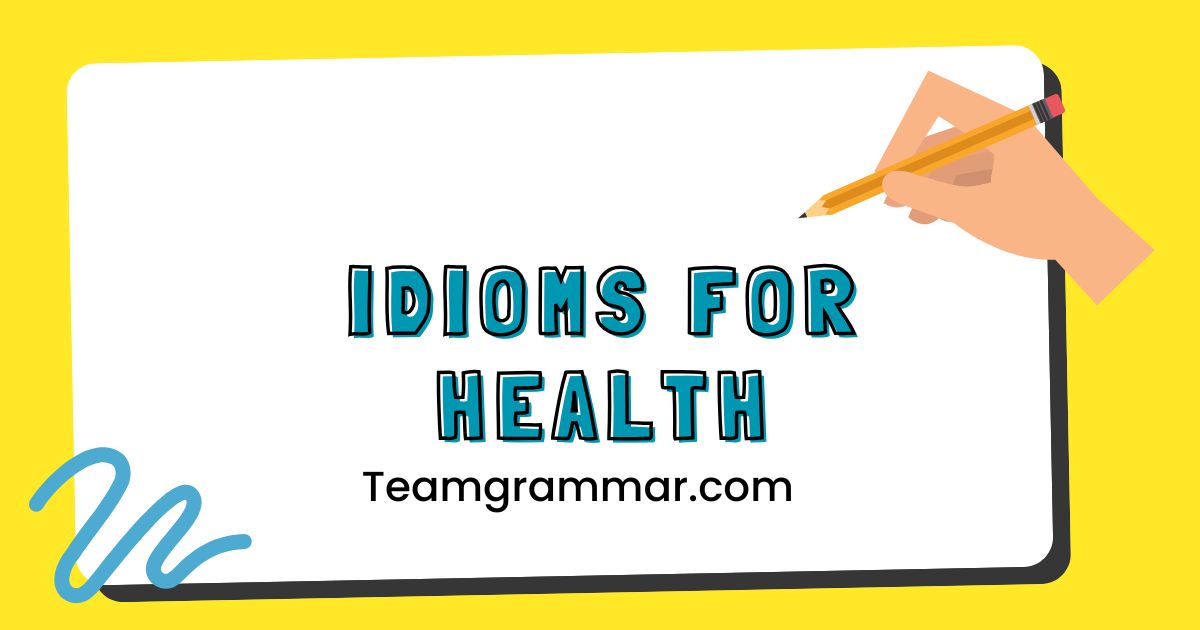50 Idioms for Health: Mastering Figurative Language in Wellness
Idioms add color and depth to the English language, allowing us to express complex ideas in concise and engaging ways. When discussing health, idioms can be particularly useful for conveying subtle nuances and shared understandings about well-being.
Understanding these idioms not only enhances your comprehension of English but also provides a richer vocabulary for discussing health-related topics. This article is designed for English language learners of all levels who wish to improve their understanding and use of idioms related to health and wellness, offering definitions, examples, and practice exercises to help master this important aspect of the English language.
This article aims to equip you with the knowledge and skills to confidently use idioms related to health in everyday conversations, writing, and professional settings. By mastering these expressions, you’ll be able to communicate more effectively and add a touch of fluency to your language skills.
Table of Contents
- Definition of Idioms for Health
- Structural Breakdown of Health Idioms
- Types and Categories of Health Idioms
- Examples of Health Idioms
- Usage Rules for Health Idioms
- Common Mistakes with Health Idioms
- Practice Exercises
- Advanced Topics in Health Idioms
- Frequently Asked Questions
- Conclusion
Definition of Idioms for Health
An idiom is a phrase or expression whose meaning cannot be understood from the literal meanings of its individual words. Instead, it has a figurative meaning that is known through common usage.
Idioms related to health are phrases that describe aspects of physical or mental well-being, illness, recovery, and healthy habits in a non-literal way. These idioms often draw on metaphors and analogies to convey complex ideas about health in an accessible and memorable manner.
Classification: Health idioms can be classified into several categories, including those related to physical condition, mental state, recovery, and healthy lifestyle. Each category provides a unique perspective on how health is perceived and discussed in the English language.
Function:The primary function of health idioms is to provide a concise and vivid way to communicate about health-related topics. They add color and expressiveness to language, making it more engaging and relatable.
Idioms can also convey cultural attitudes and beliefs about health, reflecting how different societies view well-being.
Contexts: Health idioms are commonly used in everyday conversations, medical settings, health and wellness articles, and even in literature and media. Understanding these idioms is essential for comprehending spoken and written English, as well as for communicating effectively with native English speakers about health-related matters.
Structural Breakdown of Health Idioms
Health idioms, like all idioms, typically consist of a fixed combination of words that function as a single unit of meaning. The structure of these idioms can vary, but they often include common grammatical elements such as nouns, verbs, adjectives, and prepositions.
Understanding the structural elements of health idioms can help learners recognize and interpret them more easily.
Noun-Based Idioms: These idioms often use nouns to represent a state of health or a health-related concept. For example, “a clean bill of health” uses the noun phrase “bill of health” to signify a positive medical assessment.
Verb-Based Idioms: These idioms use verbs to describe actions or states related to health. For example, “to kick the bucket” uses the verb “kick” to represent the act of dying.
Adjective-Based Idioms: These idioms use adjectives to describe the quality or condition of health. For example, “hale and hearty” uses the adjectives “hale” and “hearty” to describe someone in good health.
Prepositional Idioms: These idioms use prepositions to connect words and create a figurative meaning related to health. For example, “under the weather” uses the preposition “under” to indicate a state of mild illness.
Many health idioms follow specific patterns that can aid in comprehension. Recognizing these patterns can make it easier to understand and remember new idioms.
For example, some idioms use contrasting words to emphasize a point, such as “alive and kicking,” which highlights vitality and energy.
Types and Categories of Health Idioms
Health idioms can be categorized based on the specific aspect of health they relate to. This classification helps in understanding the different dimensions of health and wellness that are commonly expressed through figurative language.
Physical Condition
These idioms describe the physical state of a person, including their strength, fitness, and overall physical well-being. Examples include “hale and hearty,” “in the pink,” and “fit as a fiddle.”
Mental State
These idioms relate to mental health and emotional well-being, including states of stress, anxiety, happiness, and emotional resilience. Examples include “on cloud nine,” “to have a screw loose,” and “to be down in the dumps.”
Recovery
These idioms describe the process of recovering from illness or injury, as well as the state of being healed or restored to health. Examples include “back on one’s feet,” “on the mend,” and “as good as new.”
Healthy Lifestyle
These idioms describe habits and behaviors that promote good health, such as exercise, healthy eating, and stress management. Examples include “recharge one’s batteries,” “clean as a whistle,” and “a balanced diet.”
Illness and Death
These idioms describe states of being unwell, suffering from a disease, or the ultimate end of life. Examples include “to be under the weather,” “to feel like death warmed over,” and “to kick the bucket.”
Examples of Health Idioms
To fully grasp the meaning and usage of health idioms, it is essential to examine specific examples within each category. The following tables provide a comprehensive collection of health idioms, along with their meanings and example sentences.
Physical Condition Idioms
This table includes idioms that describe physical health, fitness, and overall well-being.
| Idiom | Meaning | Example Sentence |
|---|---|---|
| Hale and hearty | Healthy and strong, especially in old age | Despite his age, he’s still hale and hearty and enjoys long walks every day. |
| In the pink | In good health | She’s been in the pink since she started her new exercise routine. |
| Fit as a fiddle | In excellent physical condition | He runs every morning and eats healthily, so he’s as fit as a fiddle. |
| Full of beans | Energetic and lively | The children were full of beans after their nap. |
| Alive and kicking | Healthy and active | Despite his near-fatal accident, he’s alive and kicking. |
| As right as rain | Perfectly well | After a good night’s sleep, I felt as right as rain. |
| In fine fettle | In good condition or spirits | The team is in fine fettle for the upcoming competition. |
| Sound as a bell | In perfect condition | The doctor said my heart is as sound as a bell. |
| Strong as an ox | Very strong and healthy | He’s as strong as an ox; he can lift incredibly heavy objects. |
| Bursting with energy | Having a lot of energy | The kids are bursting with energy after their summer vacation. |
| Bright-eyed and bushy-tailed | Alert, enthusiastic, and ready to start the day | She arrived at the meeting bright-eyed and bushy-tailed, ready to present her ideas. |
| Hearty as a horse | Very healthy and strong | My grandfather is hearty as a horse, even at 90 years old. |
| Healthy as a lark | Very healthy and cheerful | After spending the summer in the countryside, she returned healthy as a lark. |
| In rude health | Extremely healthy | Despite his age, he’s in rude health and still works on his farm. |
| On top of the world | Feeling extremely happy and healthy | After winning the race, he felt on top of the world. |
| In good shape | In good physical condition | She runs regularly to stay in good shape. |
| Full of life | Energetic and enthusiastic | Even in his old age, he was full of life and always ready for an adventure. |
| Like new | In excellent condition, as if recently made | After the repairs, the car felt like new. |
| As fit as a flea | Extremely fit and active | He’s always running around, as fit as a flea. |
| Able-bodied | Physically fit and capable of doing physical work | The construction company hires only able-bodied workers. |
| In tip-top shape | In excellent condition | The athlete trained hard to get into tip-top shape for the Olympics. |
| Fresh as a daisy | Feeling energetic and refreshed | After a good night’s sleep, she felt as fresh as a daisy. |
| Full of vim and vigor | Full of energy and enthusiasm | The team entered the final match full of vim and vigor. |
| In the best of health | Enjoying excellent health | At his retirement party, he was celebrated for being in the best of health. |
| Healthy and happy | In good physical and mental condition | The key to a long life is to stay healthy and happy. |
| As strong as a horse | Very strong and healthy | He can carry heavy loads because he’s as strong as a horse. |
Mental State Idioms
This table includes idioms that describe mental and emotional well-being, stress, and emotional resilience.
| Idiom | Meaning | Example Sentence |
|---|---|---|
| On cloud nine | Extremely happy | She was on cloud nine after receiving the job offer. |
| Down in the dumps | Feeling sad or depressed | He’s been down in the dumps since he lost his job. |
| To have a screw loose | To be slightly crazy or eccentric | He’s always doing strange things; I think he has a screw loose. |
| To be stressed out | Feeling overwhelmed with stress | She’s been stressed out with work lately. |
| To be at peace | Feeling calm and content | After years of struggle, he finally felt at peace. |
| To lose one’s mind | To become crazy or irrational | The pressure of the deadline caused him to lose his mind. |
| To be on edge | Feeling nervous or anxious | She was on edge waiting for the exam results. |
| To keep one’s chin up | To stay positive despite difficulties | Even though things are tough, try to keep your chin up. |
| To be in good spirits | Feeling cheerful and optimistic | Despite the challenges, she was in good spirits. |
| To have a weight off one’s shoulders | To feel relieved after a burden is lifted | After finishing the project, I felt like I had a weight off my shoulders. |
| To be beside oneself | Extremely upset or agitated | She was beside herself with worry when her child went missing. |
| To feel blue | To feel sad or depressed | He’s been feeling blue ever since his vacation ended. |
| To be on an emotional roller coaster | Experiencing many emotions in a short period | The project was an emotional roller coaster, with many ups and downs. |
| To have a nervous breakdown | To suffer a period of mental illness | The stress of the job caused her to have a nervous breakdown. |
| To be cool as a cucumber | Very calm and relaxed | Despite the chaos, he remained as cool as a cucumber. |
| To be as happy as a clam | Very happy and content | She’s as happy as a clam now that she’s retired. |
| To be walking on air | Feeling extremely happy | He was walking on air after his promotion. |
| To be in a state of bliss | Feeling complete happiness | She was in a state of bliss during her honeymoon. |
| To be on top of the world | Feeling extremely happy and healthy | After winning the championship, they felt on top of the world. |
| To be as pleased as punch | Extremely pleased | He was as pleased as punch with his new car. |
| To be over the moon | Extremely happy | She was over the moon when she found out she was pregnant. |
| To be floating on air | Feeling extremely happy and light | She was floating on air after receiving the award. |
| To be in seventh heaven | Feeling completely happy | He was in seventh heaven during his vacation in Hawaii. |
| To be on a high | Feeling very happy and excited | She was on a high after performing on stage. |
Recovery Idioms
This table includes idioms that describe the process of recovering from illness or injury.
| Idiom | Meaning | Example Sentence |
|---|---|---|
| Back on one’s feet | Recovered from illness or hardship | After a few weeks of rest, he was back on his feet. |
| On the mend | Recovering from illness | She’s been on the mend since her surgery. |
| As good as new | Fully recovered or restored | After the repairs, the car was as good as new. |
| Turning the corner | Beginning to improve after a difficult period | The patient is finally turning the corner after a long illness. |
| Out of the woods | Out of danger or difficulty | The company is not completely out of the woods yet, but things are improving. |
| On the road to recovery | Making progress towards recovery | He’s on the road to recovery after his accident. |
| To bounce back | To recover quickly | She always bounces back from setbacks. |
| To get over something | To recover from an illness or emotional upset | It took her a while to get over the flu. |
| To be on the upswing | To be improving after a decline | The economy is on the upswing after the recession. |
| To be out of harm’s way | To be safe from danger or injury | After the storm, they were glad to be out of harm’s way. |
| To be on the right track | Making progress in the right direction | The rehabilitation program is helping him get on the right track. |
| To be on the mend | Recovering from an illness or injury | She’s been on the mend since her surgery. |
| To come around | To recover consciousness | After the fainting spell, he slowly came around. |
| To convalesce | To recover health and strength after illness | He’s convalescing at home after his surgery. |
| To heal up | To recover completely from an injury or wound | The cut on his arm is starting to heal up. |
| To make a comeback | To return to a previous level of success or health | The athlete made a comeback after his injury. |
| To pick up | To improve in health or condition | She’s starting to pick up after her illness. |
| To pull through | To survive a serious illness or injury | He pulled through despite the severity of his injuries. |
| To rally | To recover or improve after a period of weakness | The patient rallied after the surgery. |
| To snap back | To recover quickly from an illness or setback | She snapped back after a few days of rest. |
Healthy Lifestyle Idioms
This table includes idioms that describe habits and behaviors that promote good health.
| Idiom | Meaning | Example Sentence |
|---|---|---|
| Recharge one’s batteries | To rest and regain energy | I need to recharge my batteries after a long week at work. |
| Clean as a whistle | Completely healthy and free from harmful substances | The athlete is clean as a whistle; he doesn’t use any performance-enhancing drugs. |
| A balanced diet | A diet that includes all the necessary nutrients | A balanced diet is essential for good health. |
| To burn the candle at both ends | To work or do too much, leading to exhaustion | He’s been burning the candle at both ends to meet the deadline. |
| Early to bed, early to rise | A proverb suggesting that going to bed and waking up early is beneficial | He believes in the saying “early to bed, early to rise” and wakes up at 5 AM every day. |
| To get a new lease on life | To have a fresh start or renewed energy | After quitting smoking, he felt like he got a new lease on life. |
| To take a chill pill | To relax and calm down | You need to take a chill pill and stop worrying so much. |
| To take it easy | To relax and avoid stress | The doctor told him to take it easy after his heart attack. |
| To work up a sweat | To exercise vigorously | He works up a sweat every morning at the gym. |
| To keep in shape | To maintain good physical condition | She goes to the gym regularly to keep in shape. |
| To watch one’s weight | To be careful about what one eats to avoid gaining weight | She’s watching her weight and avoiding sugary foods. |
| To get some shut-eye | To get some sleep | I need to get some shut-eye before the long drive. |
| To eat like a horse | To eat a large amount of food | He eats like a horse and never gains weight. |
| To grab forty winks | To take a short nap | I’m going to grab forty winks before we leave. |
| To hit the hay | To go to bed | I’m exhausted; I’m going to hit the hay. |
| To nourish the body | To provide the body with essential nutrients | A healthy diet helps to nourish the body. |
| To take care of oneself | To look after one’s health and well-being | It’s important to take care of oneself by eating well and exercising. |
| To treat one’s body like a temple | To take very good care of one’s health | He treats his body like a temple, avoiding unhealthy foods and exercising regularly. |
| To work up an appetite | To become hungry through physical activity | We worked up an appetite after hiking all day. |
| To have a sweet tooth | To have a strong liking for sweet foods | She has a sweet tooth and loves to eat desserts. |
Usage Rules for Health Idioms
Using health idioms correctly requires understanding their specific meanings and contexts. While idioms can add richness to your language, using them inappropriately can lead to confusion or miscommunication.
Here are some key rules to follow when using health idioms:
- Understand the Meaning: Always ensure you know the precise meaning of an idiom before using it. Idioms often have figurative meanings that differ significantly from the literal meanings of their individual words.
- Consider the Context: Use idioms in appropriate contexts. Some idioms are more suitable for informal conversations, while others are appropriate for formal settings.
- Avoid Overuse: While idioms can enhance your language, overuse can make your speech sound unnatural or contrived. Use them sparingly and purposefully.
- Be Aware of Cultural Differences: Some idioms are specific to certain cultures or regions. Be mindful of your audience and avoid using idioms that they may not understand.
- Maintain Grammatical Accuracy: Ensure that the idiom fits grammatically within the sentence. Pay attention to verb tenses, subject-verb agreement, and other grammatical rules.
Exceptions and Special Cases: Some idioms may have variations in wording or usage depending on the region or context. It’s important to be aware of these variations and use the most appropriate form for your audience.
Common Mistakes with Health Idioms
One common mistake is interpreting idioms literally, which can lead to misunderstandings. For example, someone might misinterpret “to be under the weather” as being physically outside during bad weather, rather than feeling ill.
Another mistake is using idioms in inappropriate contexts. For example, using a very informal idiom in a formal medical report would be inappropriate.
Examples of Common Mistakes:
| Incorrect | Correct | Explanation |
|---|---|---|
| He is literally on cloud nine after eating an ice cream. | He is on cloud nine after receiving the job offer. | The idiom “on cloud nine” means extremely happy, not literally on a cloud. |
| The doctor told him to kick the bucket and relax. | The doctor told him to take it easy and relax. | “Kick the bucket” means to die and is inappropriate in a medical context advising relaxation. |
| She is feeling blue because she is literally the color blue. | She is feeling blue because she is sad. | “Feeling blue” means feeling sad, not literally being the color blue. |
Practice Exercises
Test your understanding of health idioms with these practice exercises. Fill in the blanks with the appropriate idiom from the list provided.
Idiom List: On the mend, full of beans, under the weather, a clean bill of health, recharge my batteries, in the pink, kick the bucket, on cloud nine, hale and hearty, lose one’s mind.
| Question | Answer |
|---|---|
| 1. After a week of vacation, I need to __________. | recharge my batteries |
| 2. The doctor gave me __________ after my check-up. | a clean bill of health |
| 3. She’s been __________ since she started her new job. | on cloud nine |
| 4. He’s __________ after a long illness. | on the mend |
| 5. The children were __________ after their nap. | full of beans |
| 6. He’s __________ today, so he stayed home from work. | under the weather |
| 7. Despite his age, he’s still __________. | hale and hearty |
| 8. The pressure of the deadline caused him to __________. | lose one’s mind |
| 9. She’s __________ since she started her new exercise routine. | in the pink |
| 10. He is so old, he might __________ soon. | kick the bucket |
Exercise 2: Match the idiom with its meaning.
| Idiom | Meaning |
|---|---|
| 1. To be as right as rain | a. Feeling sad or depressed |
| 2. To feel blue | b. To recover quickly |
| 3. To bounce back | c. Perfectly well |
| 4. To take it easy | d. To relax and avoid stress |
| 5. To burn the candle at both ends | e. To work or do too much, leading to exhaustion |
Answers: 1-c, 2-a, 3-b, 4-d, 5-e
Exercise 3: Choose the correct idiom to complete the sentence.
| Question | Options | Answer |
|---|---|---|
| 1. After the surgery, he was __________. | a. full of beans b. on the mend c. down in the dumps | b. on the mend |
| 2. She’s been working so hard that she’s __________. | a. burning the candle at both ends b. in the pink c. on cloud nine | a. burning the candle at both ends |
| 3. After a good night’s sleep, I felt __________. | a. under the weather b. as right as rain c. to have a screw loose | b. as right as rain |
| 4. She was __________ after receiving the promotion. | a. on cloud nine b. to kick the bucket c. under the weather | a. on cloud nine |
| 5. The doctor advised him to __________ after his illness. | a. lose his mind b. take it easy c. recharge his batteries | b. take it easy |
Advanced Topics in Health Idioms
For advanced learners, exploring the etymology and cultural significance of health idioms can provide a deeper understanding of their usage. Many health idioms have historical roots that reflect past beliefs and practices related to health and medicine.
Understanding these origins can add a layer of appreciation for the richness and complexity of the English language.
Regional Variations: Be aware that some health idioms may vary in meaning or usage depending on the region. Exploring these regional differences can enhance your ability to communicate effectively with diverse groups of English speakers.
Using Idioms in Writing: Incorporating health idioms into your writing can add color and expressiveness to your prose. However, it’s important to use idioms judiciously and ensure that they are appropriate for your audience and purpose.
Frequently Asked Questions
Q1: What is an idiom?
An idiom is a phrase or expression whose meaning cannot be understood from the literal meanings of its individual words. Instead, it has a figurative meaning that is known through common usage.
For instance, “to kick the bucket” means to die, not literally to kick a bucket.
Q2: Why is it important to learn health idioms?
Learning health idioms helps you understand and communicate more effectively about health-related topics in English. It allows you to grasp the nuances of conversations and written materials and to express yourself more vividly and accurately.
Q3: How can I learn health idioms effectively?
To learn health idioms effectively, study lists of common idioms, practice using them in sentences, and pay attention to how they are used in context (e.g., in conversations, articles, and media). Flashcards, online quizzes, and language exchange partners can also be helpful tools.
Q4: Are health idioms universal across all English-speaking countries?
While many health idioms are widely understood, some may be more common in certain regions or cultures. Be aware of regional variations and consider your audience when using idioms.
Q5: Can I use health idioms in formal writing?
It depends on the context and purpose of your writing. While idioms can add color to your writing, they may not always be appropriate for formal or academic settings.
Use them judiciously and consider your audience.
Q6: What are some common mistakes to avoid when using health idioms?
Common mistakes include interpreting idioms literally, using them in inappropriate contexts, and overuse. Always ensure you understand the meaning of an idiom and that it fits grammatically within the sentence.
Q7: How can I improve my understanding of health idioms in context?
Immerse yourself in English language materials, such as books, articles, movies, and TV shows. Pay attention to how health idioms are used and try to infer their meanings from the surrounding context.
Engage in conversations with native English speakers to practice using idioms in real-time.
Q8: Where can I find more resources for learning health idioms?
You can find more resources for learning health idioms in English language textbooks, online dictionaries, idiom websites, and language learning apps. Look for resources that provide definitions, examples, and practice exercises.
Q9: How do I avoid misusing idioms?
The best way to avoid misusing idioms is to ensure you fully understand their meaning and the context in which they are appropriately used. If you’re unsure, it’s better to use a more literal expression to avoid confusion.
Q10: What’s the best way to remember idioms?
Repetition and context are key. Try to use new idioms in your own sentences, and look out for them in what you read and hear.
Creating associations or visual aids can also help with memorization.
Conclusion
Mastering idioms for health is a valuable step in enhancing your English language skills. By understanding the definitions, structural elements, usage rules, and common mistakes associated with these expressions, you can communicate more effectively and confidently about health-related topics.
Remember to practice using these idioms in context and be mindful of cultural differences to ensure accurate and appropriate usage.
Continue to explore and expand your knowledge of English idioms through reading, listening, and practicing. The more you immerse yourself in the language, the more naturally and fluently you will be able to use idioms in your everyday communication.
Happy learning!







